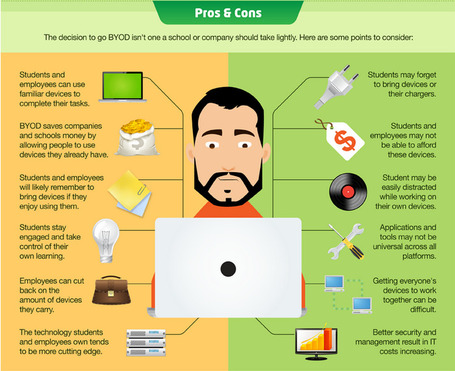
CP Schools. (2014). Frequently Asked Questions (FAQs). Retrieved from: http://www.cpschools.com/BYOD/BYOD_FAQs.php
As society becomes dependent on technology, lifestyles, norms and education changes to assist these technological structures. Within the education system, many schools are creating a program which encourages students to bring your own device (BYOD) to school. "BYOD empowers students to become the experts with the device they have" by giving students "access to a variety of resources and tools to support their learning anywhere, anytime, at any pace and individual path" (Upper Grand District School Board, ND).
As a teacher candidate experiencing the transition from a ban of personal devices within the class to an encouragement towards personal devices; I believe these technologies potentially hinder a student’s ability to develop knowledge. I agree with the Upper Grand District School Board stating personal devices enrich educational experience by allowing students to engage deeply by using hands on activity to enhance ones learning. But I question students dependencies developed for/on their devices. Technology has many great factors that should be taught to students. These factors are
- Providing easy access to information
- Learning how to research
- Becoming aware of global issues
- Having a wide range of resources
However, why are the below issues overlooked?
- Increased cyber bullying
- Decreased life span
- Makes children dependent on technology to find all their information instead of thinking or storing it in their own minds
- Having poor communication skills
- Losing basic/real world skills such as basic math, vocabulary, and geography
- Not learning basics such as how to use a map, how to have a face-to-face conversation, or even how to write
- Some students/families cannot afford devices

Manning, K. (2014). 5 Reasons Why Bring Your Own Device Is Becoming Popular. Retrieved from: http://www.itsmonkie.co.uk/5-reasons-bring-device-becoming-popular/
What happened to teaching students how to find out information on their own?
I believe that without BYOD programs students will be more engaged in their learning as they will have to actively search for information, which will make them develop more knowledge, independence as well as a longer attention span and increased information storing. Students will learn how to search for knowledge and connect a bunch of information they have learned to problem solve.
If education in the past was successful without these technologies, why make a drastic change for them now?
It is prevalent that society is more dependent on technology and it is agreed that students should have hands on experience with using technology within school. However, children who are not part of the BYOD program can learn on their own with minimal dependence on technology, leading to the development of the basic skills that many students today are lacking. Students are becoming lost without technology as these BOYD aid technologically dependent lifestyles and minds (Pyatt, 2015). In addition, Technology is a great distraction to many and because of that, having BYOD programs can lead to children feeling confused and not learning as they are focused on things they see with their devices.
As a teacher candidate, I see the benefits of devices as they help me to develop ideas as well as keep me up to date with education systems across the world. In elementary school I was taught everything without technology and with that I had great motivation, determination and goals. As I got to high school I became dependent on technology as we had similar programs to BYOD. I became so dependent on technology that I lost a lot of motivation and determination. I now regret conforming to the device programs as I now need to relearn a lot of the basic skills that are needed when there is no access to technology.
Technology is good for connecting the world and supporting ones learning, but it is overused within many schools today.
References
Pyatt, C. (2015). Teenagers becoming too dependent on technology. Retrieved from: http://cdssunrise.com/19343/opinions/teenagers-becoming-too-dependent-on-technology/
Upper Grand District School Board. (ND). Bring Your Own Device (BYOD). Retrieved from: http://www.ugdsb.on.ca/byod/